Urinary Burningaccording to TCM
Symptom family: Urinary pain and discomfort
What is Urinary Burning?
Urinary burning is characterized by an uncomfortable, often painful sensation experienced during urination. This symptom can be associated with various urinary tract conditions, reflecting inflammation, infection, or irritation. It's a signal from the body that something is amiss, whether it's a simple urinary tract infection or a more complex issue like interstitial cystitis.
How Does TCM View Urinary Burning?
In Traditional Chinese Medicine, urinary burning is seen through a holistic lens, indicative of an internal imbalance or disharmony. TCM interprets this symptom as a manifestation of Excess Heat or Dampness in the body, particularly within the urinary system.
Recognizing the specific pattern behind the burning sensation is essential, as TCM treatments aim to restore balance and address the root cause, not just the symptom.
Root Causes of Urinary Burning in TCM
TCM posits that urinary burning arises from distinct imbalances within the body's energetic system. For instance, Damp-Heat in the Bladder can lead to symptoms such as burning during urination, coupled with dark, cloudy urine and possible fever.
This pattern reflects an accumulation of heat and moisture within the urinary bladder, requiring a therapeutic strategy to clear heat and drain dampness. Understanding the underlying pattern is paramount to tailoring the treatment effectively.
Explore below more details about what might cause Urinary burning according to TCM.
- By Syndrome
- By Organ
- Heat
- Dampness
- Bladder
- Liver
- Small Intestine
Heat
In TCM "Heat" signifies an excess of Yang energy, leading to an imbalance where heat predominates over the body's cool Yin aspects. This condition is metaphorically akin to an internal over-heating. Symptoms indicative of Heat can include feelings of warmth, fever, sweating, irritability, red face, thirst with a preference for cold drinks, and a rapid pulse. The tongue may appear red with a yellow coating. Unlike the common interpretation of heat in terms of temperature, in TCM, it represents a state of hyperactivity or inflammation in the body.... see more
Heat Patterns That Can Lead to Urinary Burning
Common Symptoms: Dark Urine Hematuria Fever Frequent And Urgent Urination Urination Stopping In The Middle Of Flow Cloudy Urine Dry Mouth Without Desire To Drink Lower Abdominal Fullness And Pain
| Pattern Name | Relevant Symptoms | Relevant Formulas |
|---|---|---|
| Damp-Heat in the Bladder | Burning urination, Frequent and urgent urination, Urinary burning, Urination stopping in the middle of flow, Dark urine, Cloudy urine, Hematuria, Fever, Dry mouth without desire to drink, Lower abdominal fullness and pain, Feeling hot... see more | Ba Zheng San |
| Damp-Heat in the Liver | Burning urination, Hypochondrial fullness with warmth relief, Abdominal fullness, Lower abdominal fullness, Bitter taste in the mouth, Sticky taste in the mouth, Lack of appetite, Nausea, Feeling of heaviness, Yellow vaginal discharge, Vaginal itching, Vulvar eczema, Vulvar sores, Bleeding between periods, Midcycle bleeding pain, Red and swollen scrotum, Red and swelling genital, Papules, Itchy vesicular rashes, Urinary dysfunction, Urinary burning, Dark urine... see more | Long Dan Xie Gan Tang | Yin Chen Hao Tang |
| Full-Heat in the Small Intestine | Burning urination, Restlessness, Insomnia, Tongue ulcers, Mouth ulcers, Throat pain, Deafness, Cardiac burning sensation, Abdominal pain, Craving for cold beverages, Scanty and dark urine, Hematuria, Urinary burning... see more | Dao Chi San |
Dampness
"Dampness" in TCM is a concept that describes a pattern of disharmony where the body accumulates excess moisture. Imagine the heavy, sticky feeling you get on a very humid day; that's similar to what dampness feels like internally. It can manifest as a sense of heaviness, bloating, sluggishness, or even a foggy mind. This condition is often thought to arise from environmental factors like living in a damp place, dietary habits that promote moisture in the body, or internal imbalances that hinder the body's ability to process fluids properly. In TCM, dampness can obstruct the normal flow of energy and fluids in the body, leading to various symptoms.... see more
Dampness Patterns That Can Lead to Urinary Burning
Common Symptoms: Dark Urine Fever Frequent And Urgent Urination Urination Stopping In The Middle Of Flow Cloudy Urine Hematuria Dry Mouth Without Desire To Drink Lower Abdominal Fullness And Pain
| Pattern Name | Relevant Symptoms | Relevant Formulas |
|---|---|---|
| Damp-Heat in the Bladder | Burning urination, Frequent and urgent urination, Urinary burning, Urination stopping in the middle of flow, Dark urine, Cloudy urine, Hematuria, Fever, Dry mouth without desire to drink, Lower abdominal fullness and pain, Feeling hot... see more | Ba Zheng San |
| Damp-Heat in the Liver | Burning urination, Hypochondrial fullness with warmth relief, Abdominal fullness, Lower abdominal fullness, Bitter taste in the mouth, Sticky taste in the mouth, Lack of appetite, Nausea, Feeling of heaviness, Yellow vaginal discharge, Vaginal itching, Vulvar eczema, Vulvar sores, Bleeding between periods, Midcycle bleeding pain, Red and swollen scrotum, Red and swelling genital, Papules, Itchy vesicular rashes, Urinary dysfunction, Urinary burning, Dark urine... see more | Long Dan Xie Gan Tang | Yin Chen Hao Tang |
Bladder
In TCM the Bladder plays a crucial role beyond its basic function of storing and excreting urine. It is intimately connected with the Kidney system, helping to regulate the body's water balance and being a key component in the processing and elimination of fluids. The Bladder also influences the lower part of the body and the back. When it malfunctions or is imbalanced in TCM, it can lead to urinary issues like frequent urination, incontinence, or painful urination. Additionally, there may be problems related to its meridian pathway, such as lower back pain, stiffness, or weakness in the legs. The Bladder’s condition in TCM can also reflect emotional states, with imbalances potentially leading to feelings of fear or anxiety.... see more
Bladder Patterns That Can Lead to Urinary Burning
| Pattern Name | Relevant Symptoms | Relevant Formulas |
|---|---|---|
| Damp-Heat in the Bladder | Burning urination, Frequent and urgent urination, Urinary burning, Urination stopping in the middle of flow, Dark urine, Cloudy urine, Hematuria, Fever, Dry mouth without desire to drink, Lower abdominal fullness and pain, Feeling hot... see more | Ba Zheng San |
Liver
In TCM the Liver is viewed as the organ responsible for the smooth flow of Qi, Blood, and emotions throughout the body. It plays a key role in regulating mood, storing blood, supporting digestion, and ensuring the health of tendons and eyes. When the Liver malfunctions or is imbalanced in TCM, it can lead to a range of issues such as irritability, mood swings, menstrual irregularities, eye problems, and muscular stiffness or pain. A malfunctioning Liver in TCM reflects not only physical disturbances but also emotional and mental disharmony, emphasizing the holistic approach of TCM in addressing health and wellness.... see more
Liver Patterns That Can Lead to Urinary Burning
| Pattern Name | Relevant Symptoms | Relevant Formulas |
|---|---|---|
| Damp-Heat in the Liver | Burning urination, Hypochondrial fullness with warmth relief, Abdominal fullness, Lower abdominal fullness, Bitter taste in the mouth, Sticky taste in the mouth, Lack of appetite, Nausea, Feeling of heaviness, Yellow vaginal discharge, Vaginal itching, Vulvar eczema, Vulvar sores, Bleeding between periods, Midcycle bleeding pain, Red and swollen scrotum, Red and swelling genital, Papules, Itchy vesicular rashes, Urinary dysfunction, Urinary burning, Dark urine... see more | Long Dan Xie Gan Tang | Yin Chen Hao Tang |
Small Intestine
In TCM the Small Intestine plays a critical role in receiving partially digested food from the Stomach and further separating the clear from the turbid, essentially distinguishing nutrients from waste. This process is vital for proper absorption and assimilation of food. The Small Intestine is also associated with clarity of judgment and decision-making. When it malfunctions or is imbalanced in TCM, it can lead to digestive issues such as abdominal pain, bloating, poor appetite, or irregular bowel movements. Additionally, a malfunctioning Small Intestine may manifest as mental confusion or difficulty in making decisions, reflecting its role in discernment and clarity in both physical and mental realms. ... see more
Small Intestine Patterns That Can Lead to Urinary Burning
| Pattern Name | Relevant Symptoms | Relevant Formulas |
|---|---|---|
| Full-Heat in the Small Intestine | Burning urination, Restlessness, Insomnia, Tongue ulcers, Mouth ulcers, Throat pain, Deafness, Cardiac burning sensation, Abdominal pain, Craving for cold beverages, Scanty and dark urine, Hematuria, Urinary burning... see more | Dao Chi San |
TCM Herbal Formulas for Urinary Burning
To treat urinary burning, TCM practitioners might prescribe formulas like Ba Zheng San, which includes Chinese Pink Herbs (Qu Mai) known for their property to drain dampness and clear heat. Another formula, Long Dan Xie Gan Tang, with Chinese Gentian (Long Dan Cao), targets Damp-Heat in the Liver, addressing systemic issues that might manifest as urinary discomfort. The choice of herbs and formulas is always individualized, based on the patient's unique pattern of disharmony.
Explore below some TCM herbal formulas used to address urinary burning, organized by cause and by formula type.
- By Cause
- By Formula Type
- Heat
- Dampness
- Formulas that clear heat and expel dampness
- Formulas that clear heat from the organs
Top Formula for Heat:
Ba Zheng San
Suitable for Heat patterns that may cause urinary burning, such as Damp-Heat in the Bladder
Learn moreAll Formulas Recommended for Urinary Burning Caused by Heat
| Formula | Patterns Suitable For |
|---|---|
| Ba Zheng San | Damp-Heat in the Bladder |
| Long Dan Xie Gan Tang | Damp-Heat in the Liver |
| Yin Chen Hao Tang | Damp-Heat in the Liver |
| Dao Chi San | Full-Heat in the Small Intestine |
Top Formula for Dampness:
Ba Zheng San
Suitable for Dampness patterns that may cause urinary burning, such as Damp-Heat in the Bladder
Learn moreAll Formulas Recommended for Urinary Burning Caused by Dampness
| Formula | Patterns Suitable For |
|---|---|
| Ba Zheng San | Damp-Heat in the Bladder |
| Long Dan Xie Gan Tang | Damp-Heat in the Liver |
| Yin Chen Hao Tang | Damp-Heat in the Liver |
Formulas that clear Heat and expel dampness
These formulas are suitable for some urinary burning-causing patterns like Damp-Heat in the Bladder.
One such formula is Ba Zheng San, with chinese pink herb as a key herb.
Other formulas of this category are listed in the table below.
All "formulas that clear heat and expel dampness" recommended for urinary burning
| Formula | Patterns Suitable For (if applicable) |
|---|---|
| Ba Zheng San | Damp-Heat in the Bladder |
| Yin Chen Hao Tang | Damp-Heat in the Liver |
Formulas that clear Heat from the Organs
These formulas are suitable for some urinary burning-causing patterns like Damp-Heat in the Liver.
One such formula is Long Dan Xie Gan Tang, with chinese gentian as a key herb.
Other formulas of this category are listed in the table below.
All "formulas that clear heat from the organs" recommended for urinary burning
| Formula | Patterns Suitable For (if applicable) |
|---|---|
| Long Dan Xie Gan Tang | Damp-Heat in the Liver |
| Dao Chi San | Full-Heat in the Small Intestine |
Acupoints for Urinary Burning
Acupuncture is another modality within TCM used to address urinary burning. Points such as Baohuang BL-53 and Weizhong BL-40 are selected for their ability to regulate qi in the Lower Burner and benefit urination, while points like Ququan LIV-8 can invigorate blood and clear dampness from the lower body. These points are chosen based on their traditional indications and the practitioner's assessment of the patient's pattern of imbalance.
Explore below some acupoints used to address urinary burning, organized by meridian.
- By Meridian
- Bladder Channel
- Liver Channel
- Heart Channel
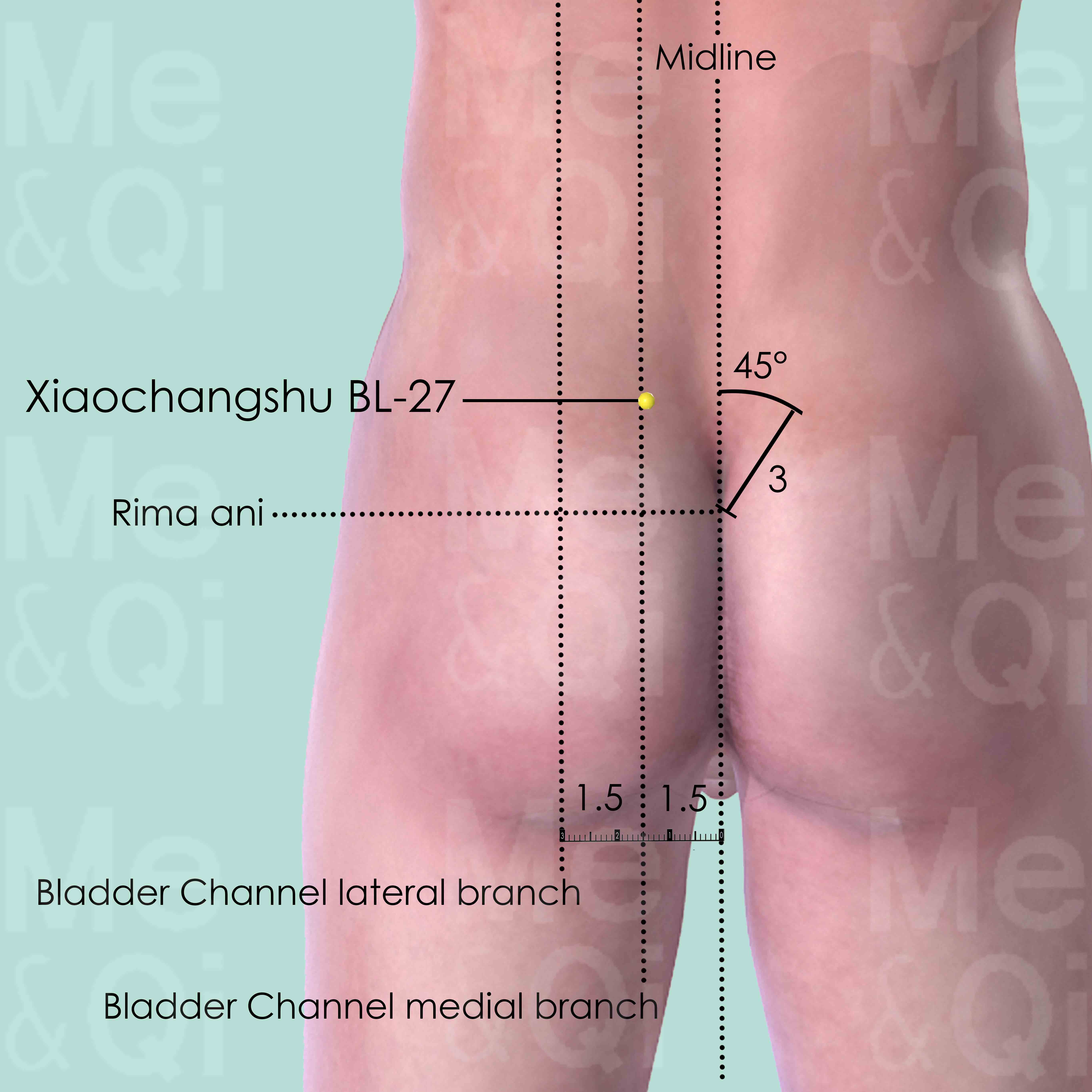
Xiaochangshu BL-27
At the level of the 1st posterior sacral foramen, 1.5 cun lateral to the posterior midline.
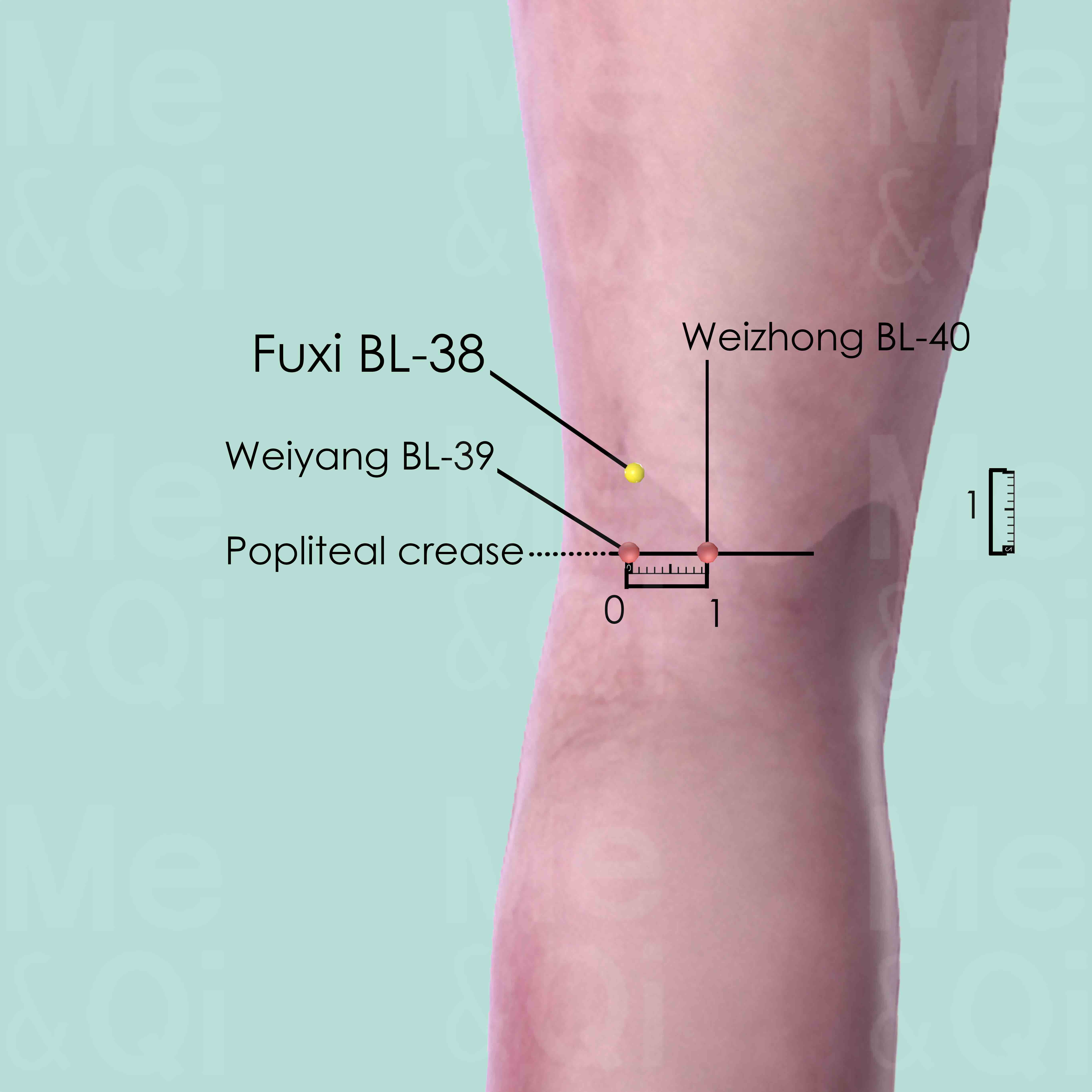
Fuxi BL-38
On the laterodorsal aspect of the knee, 1 cun superior and 1 cun lateral to Weizhong BL-40 which is in the center of the popliteal crease. It is also 1 cun above Weiyang BL-39, on the medial side of the tendon biceps femoris muscle.
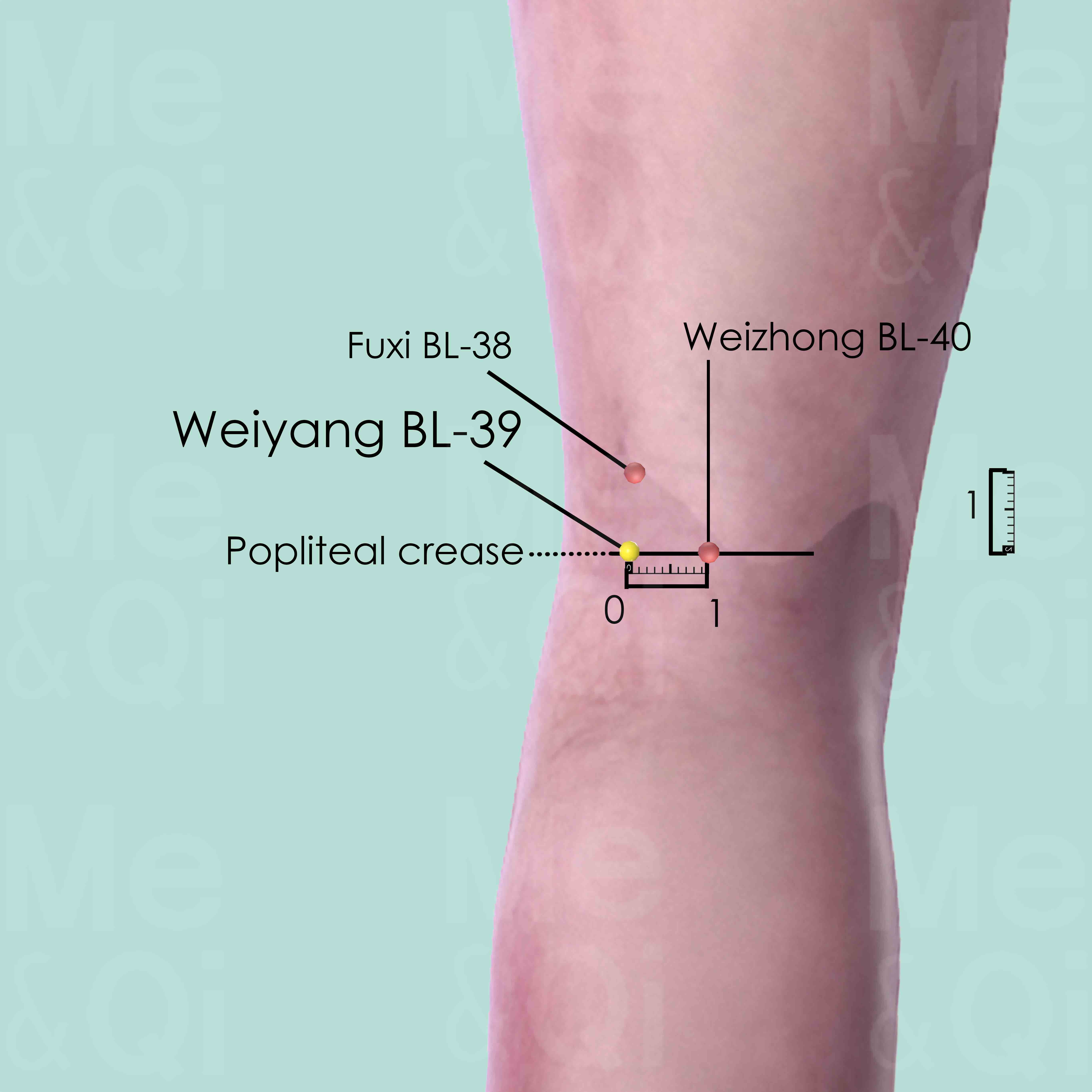
Weiyang BL-39
At the lateral end of the popliteal crease, on the medial border of the tendon of biceps femoris muscle, 1 cun lateral to Weizhong BL-40 which is the midpoint of the popliteal crease. It is also 1 cun below Fuxi BL-38.
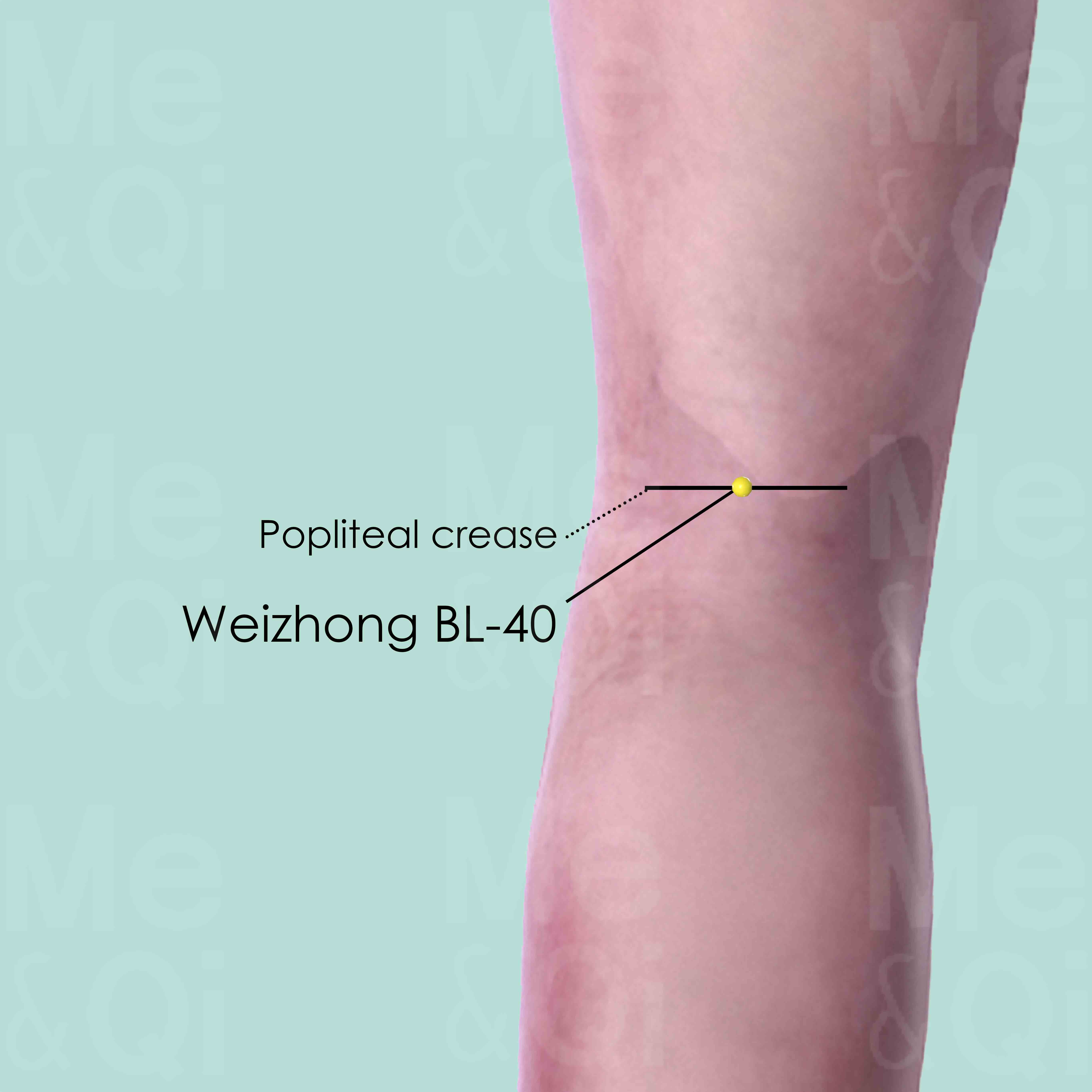
Weizhong BL-40
At the midpoint of the popliteal crease, between the tendons of biceps femoris and semitendinosus muscle.
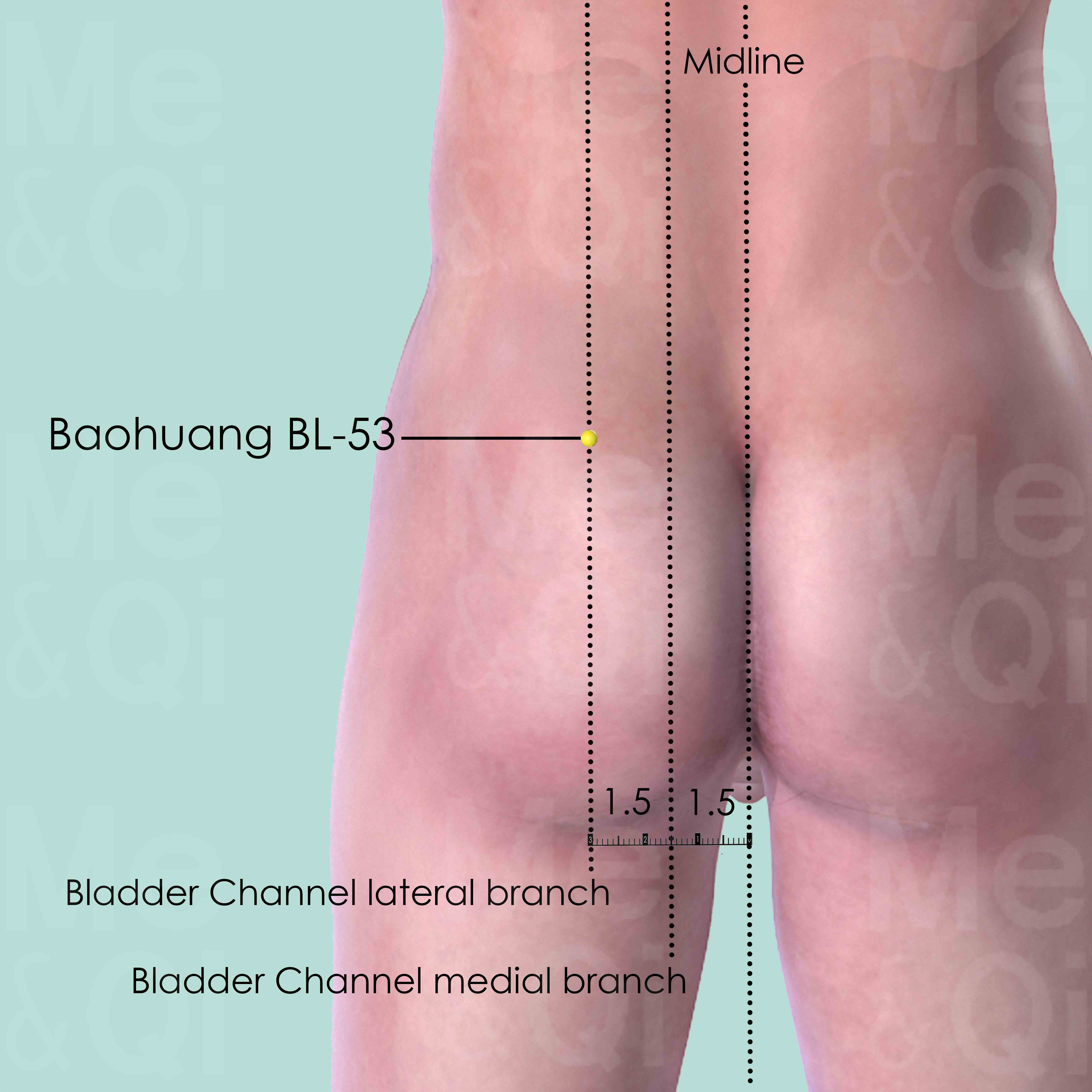
Baohuang BL-53
At the level of the 2nd posterior sacral foramen, 3 cun lateral to the posterior midline.
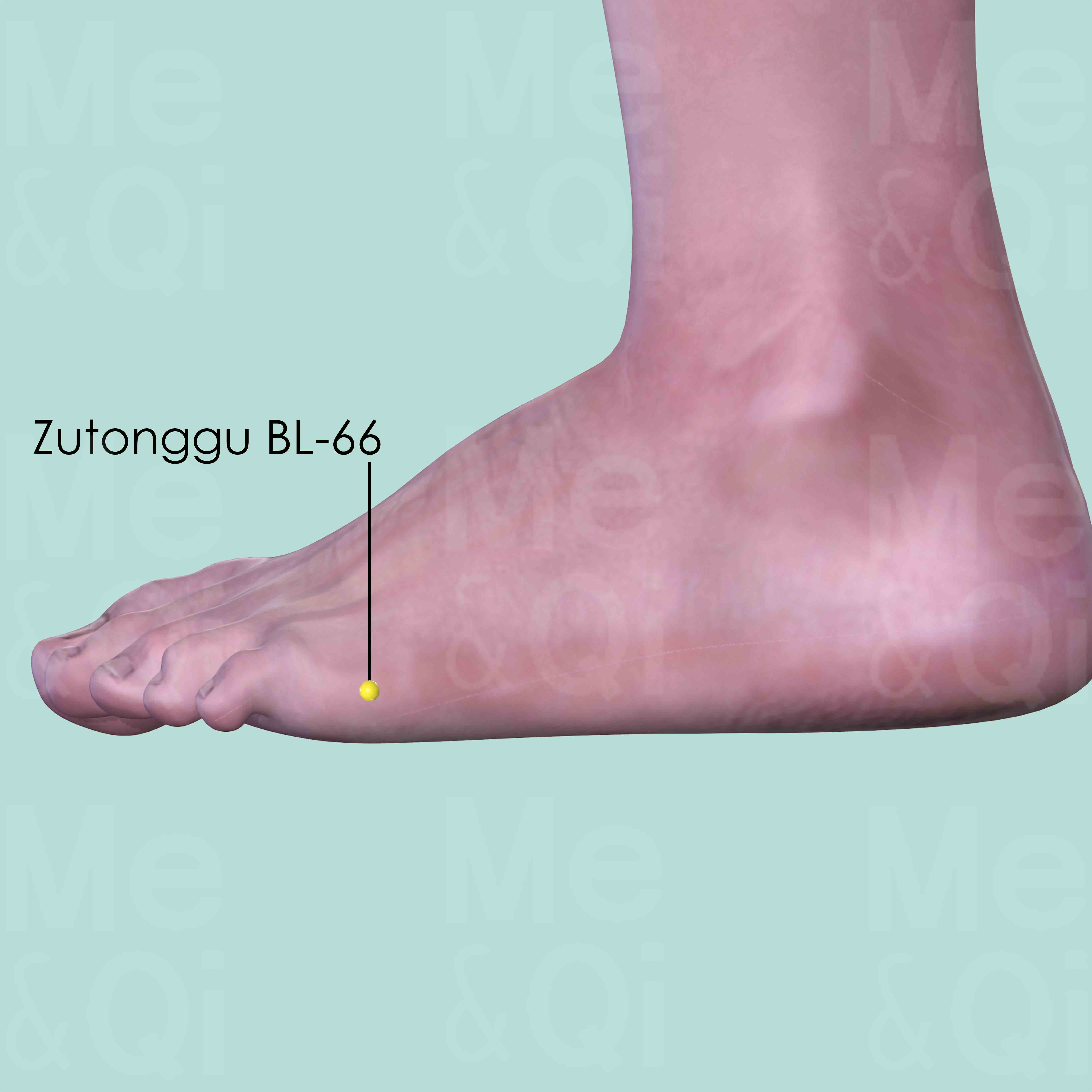
Zutonggu BL-66
In the depression distal and inferior to the 5th metatarsophalangeal joint, at the lateral border of the foot.
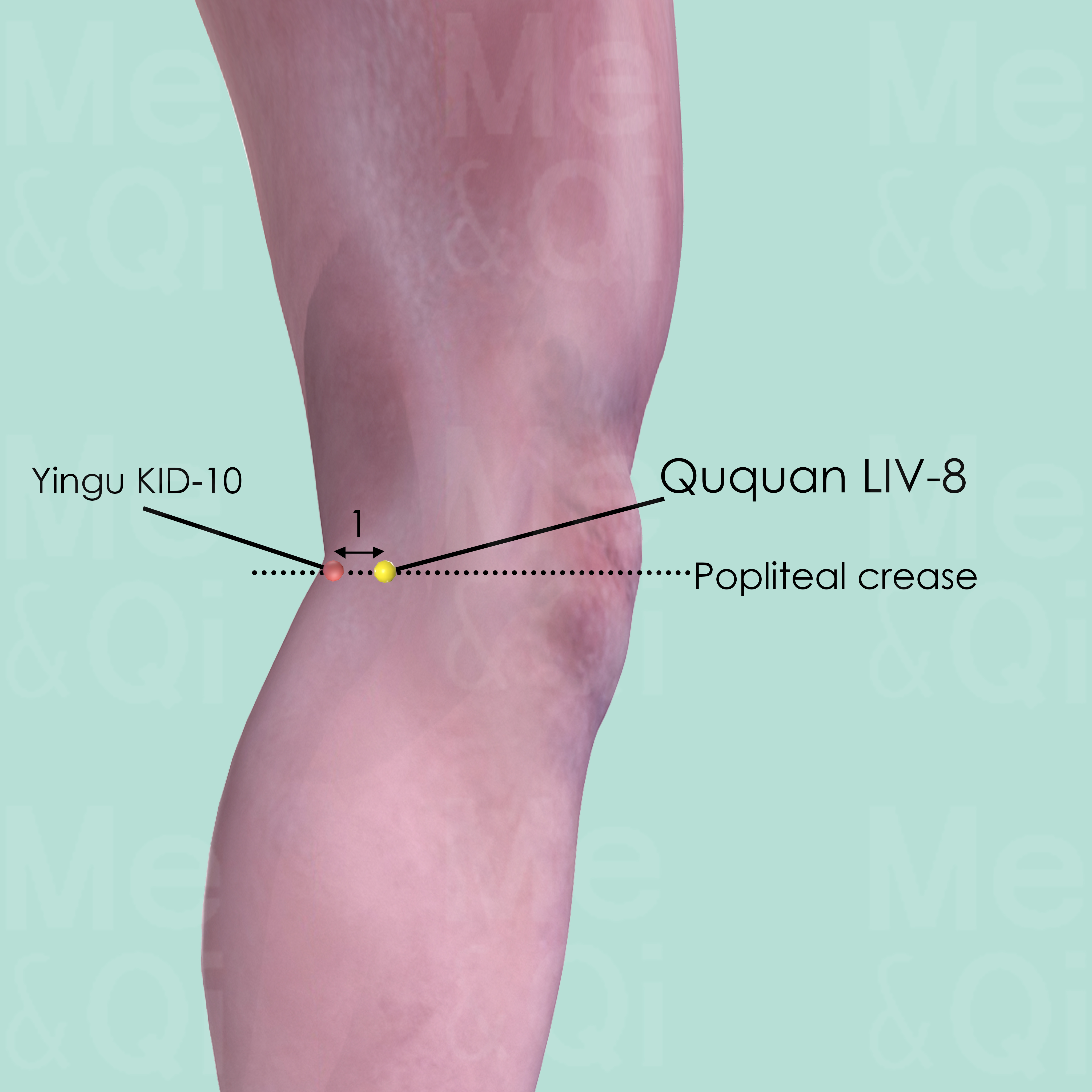
Ququan LIV-8
On the medial aspect of the knee join. Flex the knee and locate the point above the medial end of the popliteal crease, posterior to the medial condyle of the tibia, on the anterior border of the insertion of semimembranosus and semitendinosus muscle, about 1 cun anterior to Yingu KID-10.
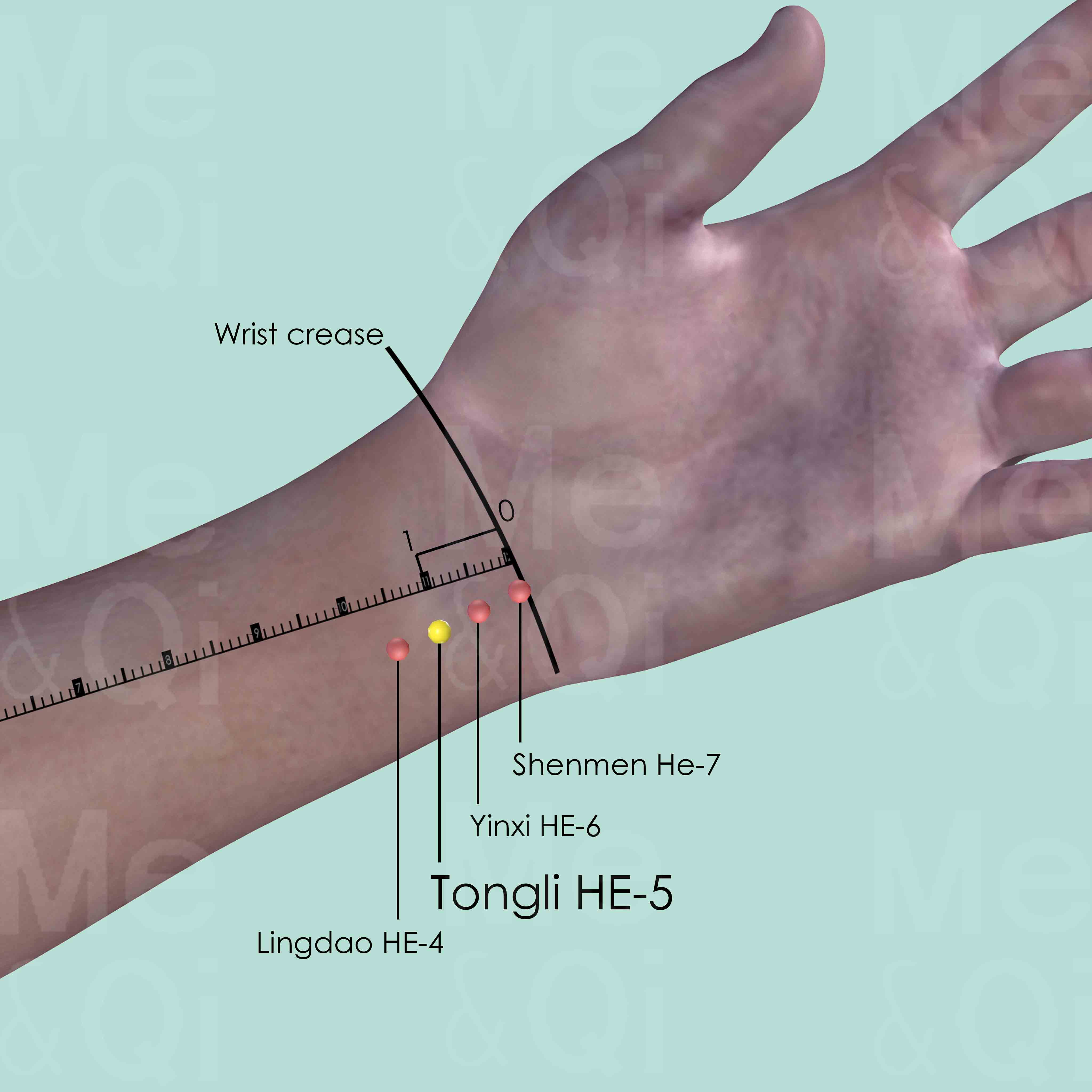
Tongli HE-5
On the radial side of the tendon of flexor carpi ulnaris muscle, 1 cun above the transverse crease of the wrist when the palm faces upward.
